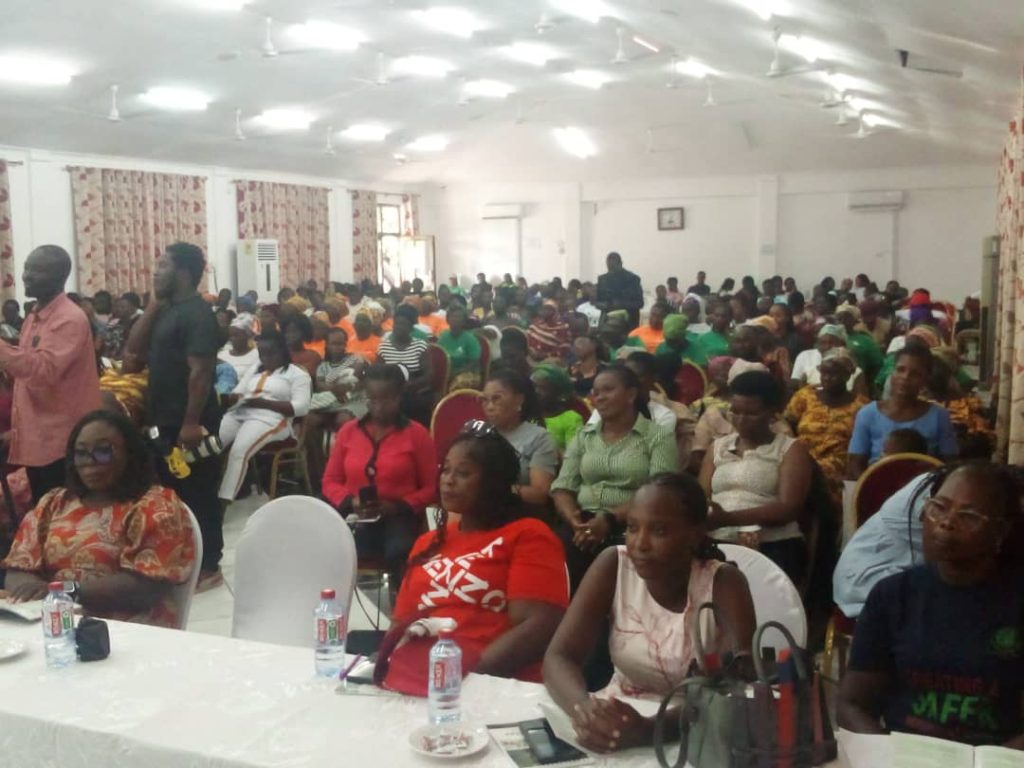By Michael Foli Jackidy
Ho (V/R), Oct 29, GNA-Nana Adjoa Sifa, the Initiator and Lead of Guzakuza, a non-government organisation (NGO) dedicated to empowering women in agribusiness across Africa, has emphasised the urgent need for strong collaborations to transform Africa’s food systems.
Speaking at the Women in Agribusiness Week Conference in Ho on Monday, she highlighted that, over the past nine years, Guzakuza has encountered numerous challenges affecting women in agribusiness, which can be alleviated through partnerships with key stakeholders and policymakers.
In her address at the conference, themed “Connecting Women, Connecting African Food Systems,” Nana Adjoa identified critical issues hindering progress for women in agribusiness.
These include restricted access to finance, land ownership, resources, and language barriers, all of which continue to hold women back in the industry.
“The theme of this conference is more than just about networking. It’s a call to dismantle the barriers that African women face in the agribusiness sector,” she noted.
Despite making up over 60% of the agricultural workforce, African women own less than 20 per cent of the land.
Even so, women produce close to 80 per cent of Africa’s food, often with minimal resources, limited support, and access to outdated technologies. At the same time, Africa imports over $50 billion in food annually, highlighting issues of food sovereignty and economic independence.
Nana Adjoa urged policymakers to adopt strategies that would ease these barriers, particularly for women striving to advance in agribusiness.
Mr. William Dzamefe, the Volta Regional Director of the Ministry of Food and Agriculture (MOFA), corroborated her points, noting that recent MOFA-2022 statistics from the Statistical Research and Information Directorate (SRID) show that women constitute over 60 per cent of the labour force in the production sector and account for more than 80 per cent of value-addition activities in basic processing.
However, he pointed out that women’s involvement drops significantly to less than 10 per cent in secondary and tertiary transformation, mainly due to limited access to credit and advanced technology.
“With fewer than ten years remaining to achieve the Sustainable Development Goals, including Zero Hunger (Goal 2) and Gender Equality (Goal 5), there’s an urgent need for collective efforts to elevate women’s roles in food systems,” Mr Dzamefe stressed.
He pledged MOFA’s support to all agricultural stakeholders, especially women, in their endeavour to sustain Ghana’s food security.
He also encouraged advocacy groups like Guzakuza and the Volta Women in Agribusiness Network (VOWAN) to remain steadfast in their mission to position women at the centre of agribusiness development.
Dr. Archibald Yao Letsa, the Volta Regional Minister, in a speech delivered on his behalf by Volta Regional Coordinating Director, Mr. Augustus Awity, reiterated the government’s commitment to supporting women in agribusiness.
He cited programs like Planting for Food and Jobs and One District, One Factory as part of the government’s efforts to enhance productivity and add value to the sector.

He emphasized: “These initiatives are just the beginning; we must continue to break down the barriers that prevent women from accessing land, finance, and technology, ensuring they are fully empowered to contribute to and benefit from Ghana’s agricultural sector.”
Mama Sename III, the Paramount Queenmother of the Mafi Traditional Area, called on traditional rulers to support women in agribusiness by facilitating their access to land and other essential resources. She also encouraged women to engage more actively in agribusiness to strengthen Africa’s food security.
Women in Agribusiness Week is an annual event dedicated to individuals passionate about agriculture, food, and agribusiness. It brings together African women in agribusiness from across the globe to share ideas and discuss impactful issues affecting the industry.
The 2024 conference included participants from countries like Togo, Nigeria, Burkina Faso, and Niger, as well as representatives from the agricultural sector and various industry players.
This event underscores the importance of empowering women as a central strategy in building resilient food systems and achieving sustainable growth in Africa’s agribusiness.
GNA